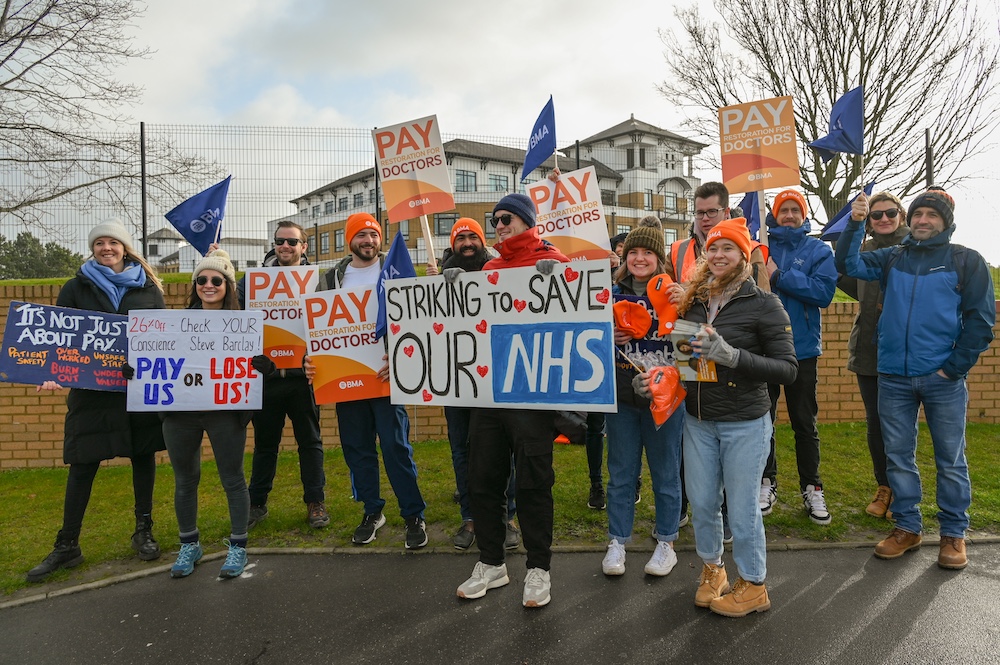
![]() The NHS is heading into another winter crisis. Winter is always a difficult time for our health service. There are extra pressures from winter illnesses, including amongst the staff. There will be a round of flu and Covid hasn’t gone away.
The NHS is heading into another winter crisis. Winter is always a difficult time for our health service. There are extra pressures from winter illnesses, including amongst the staff. There will be a round of flu and Covid hasn’t gone away.
All these are to be expected, but then there are all the other problems that they have to deal with. It was reported recently that the numbers of children being admitted to hospital with respiratory problems has rocketed in recent years with damp housing and traffic pollution as the biggest drivers.
Emergency Departments are clogged. They can’t move patients onto wards because the beds are full of people who can’t be discharged because we have a crisis in undervalued and underfunded care.
Then there are the patients in mental health crisis who can occupy a cubicle for up to 36 hours, even though the A&E staff can’t treat them.
The Police also complain that too much of their time is taken up with mental health issues. Their role is to detain people who are a risk to themselves or others, until mental health professionals can arrange treatment.
A friend of mine rang me recently, she was recovering from one of her periodic mental health crises from a Psychiatric Hospital in Brighton. She lives in Manchester, but that was the nearest available bed. No doubt she was transported the 250 miles by an ambulance crew who struggle to meet their targets to reach medical emergencies. My wife, who works in the field, says it’s not unusual to have to place people hundreds of miles from home and family because of the shortage of mental health beds.
Schools are struggling to teach children who are hungry because of the cost-of-living crisis and may not have slept well because their bedroom is damp, or they have no bed, or both.
The courts and prison service are falling apart. Prisons are over full and dangerous places for staff and prisoners alike. Part of the problem is that cases take too long to come to court. That’s because courts have been closed and Police and the CPS are understaffed so cases take longer to prepare.
All these extra problems faced by our services put pressure on the staff who deliver them, but rather than give them a bonus for going above and beyond, the Government has effectively cut their pay over the last 13 years of austerity.
The result is that services cannot recruit or retain staff, whether that’s nurses, barristers, teachers, prison officers, doctors, the list goes on and on. That in turn leads to staff shortages, which means that the remaining staff have to work even harder to keep things afloat and are more likely to leave or just burn out. It’s a vicious circle.
I haven’t even touched on local government. Leeds City Council has lost £2.5 billion since 2010. Perhaps you think the Council doesn’t really matter, it’s just cycle lanes and lighting up buildings in different colours. In fact, councils provide many of the services that hold the city together – collecting the bins, providing care for children and older people, libraries, sports centres, housing, planning, roads and so much more.
There’s a common thread to all these problems. It’s called austerity and it’s unravelling the social fabric that holds our country together.
My parents lived through ‘The Hungry 30s’ – mass unemployment, the Great Depression. When I was growing up it was inconceivable that we would see such conditions again. My parents’ generation built a safety net to stop it happening again – the Welfare State.
The NHS might have been the jewel in the crown of the Welfare State, but there was always much more to it: benefits, housing, legal aid, care, education. Each sector has been cut and cut again until there’s barely a service left. And it doesn’t save money, it just creates new problems and moves the costs elsewhere.
The answer to all this is public investment to break the vicious circle.
Take housing, which actually underpins a lot of this. Rebuilding the stock of Council houses, with truly affordable rents and security of tenure, would ease the pressure on the private rental sector and slow rent inflation, allowing renters to save enough for deposit to buy. It would give renters more choice and put pressure on landlords to sort out the damp and mould. And with proper insulation we would cut CO2 emissions and reduce costs for tenants.
Building more hospitals will ease the pressure on beds, especially psychiatric beds, allowing A&E departments to work more efficiently and in turn allowing the ambulance service to run for effectively.
And we need to invest in our staff by paying proper wages for the work they do. If we learnt one thing during the pandemic, it’s that care staff and bin crew are worth more than bankers.
There will be a general election next year, I wonder if any of the parties will put this forward in their manifesto?
While you’re here, can we ask a favour?
South Leeds Life is published by a not-for-profit social enterprise. We keep our costs as low as possible but we’ve been hit by increases in the print costs for our monthly newspaper – up 83% in the last 12 months.
Could you help support local community news by making a one off donation, or even better taking out a supporters subscription?
Donate here, or sign up for a subscription at bit.ly/SLLsubscribe


